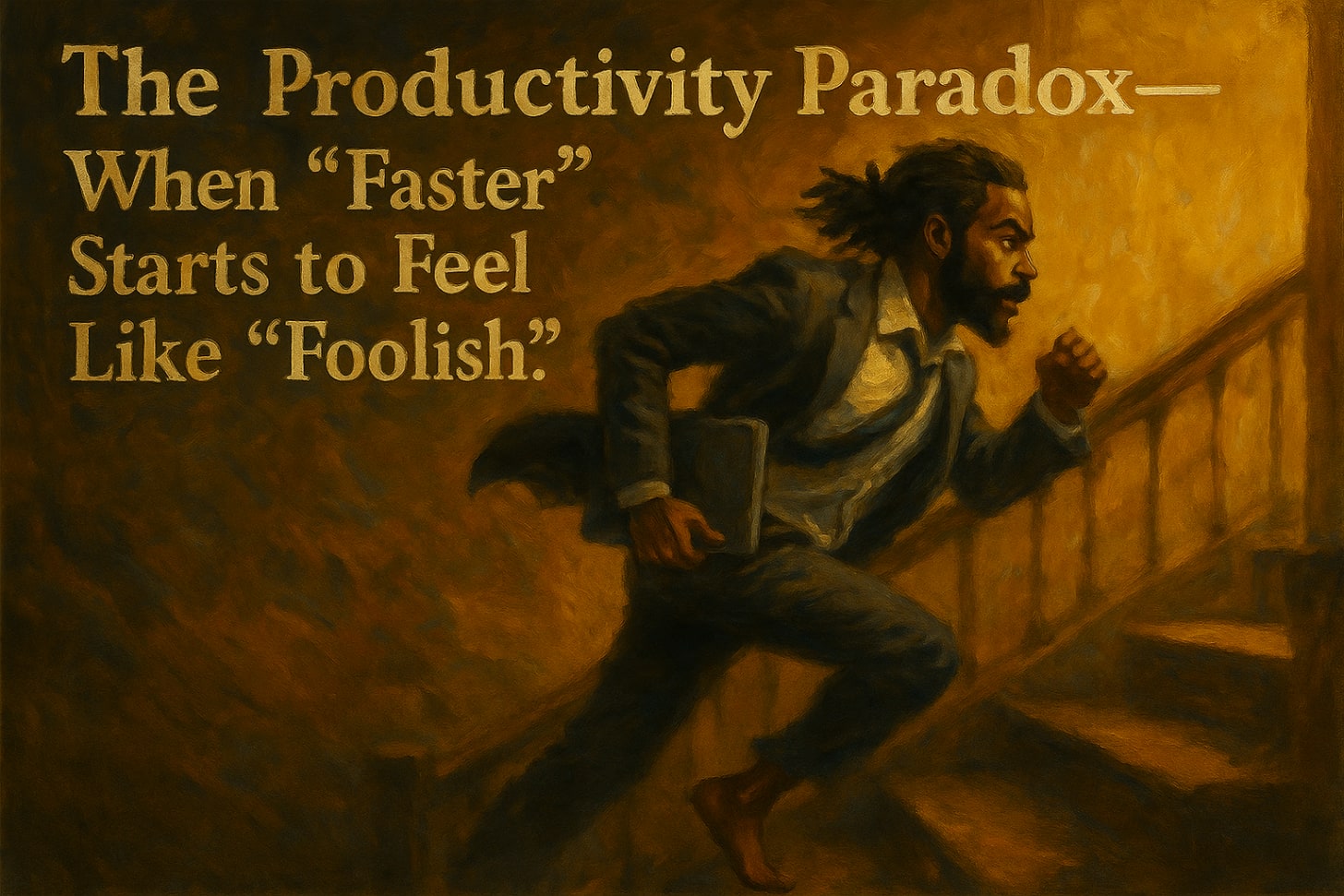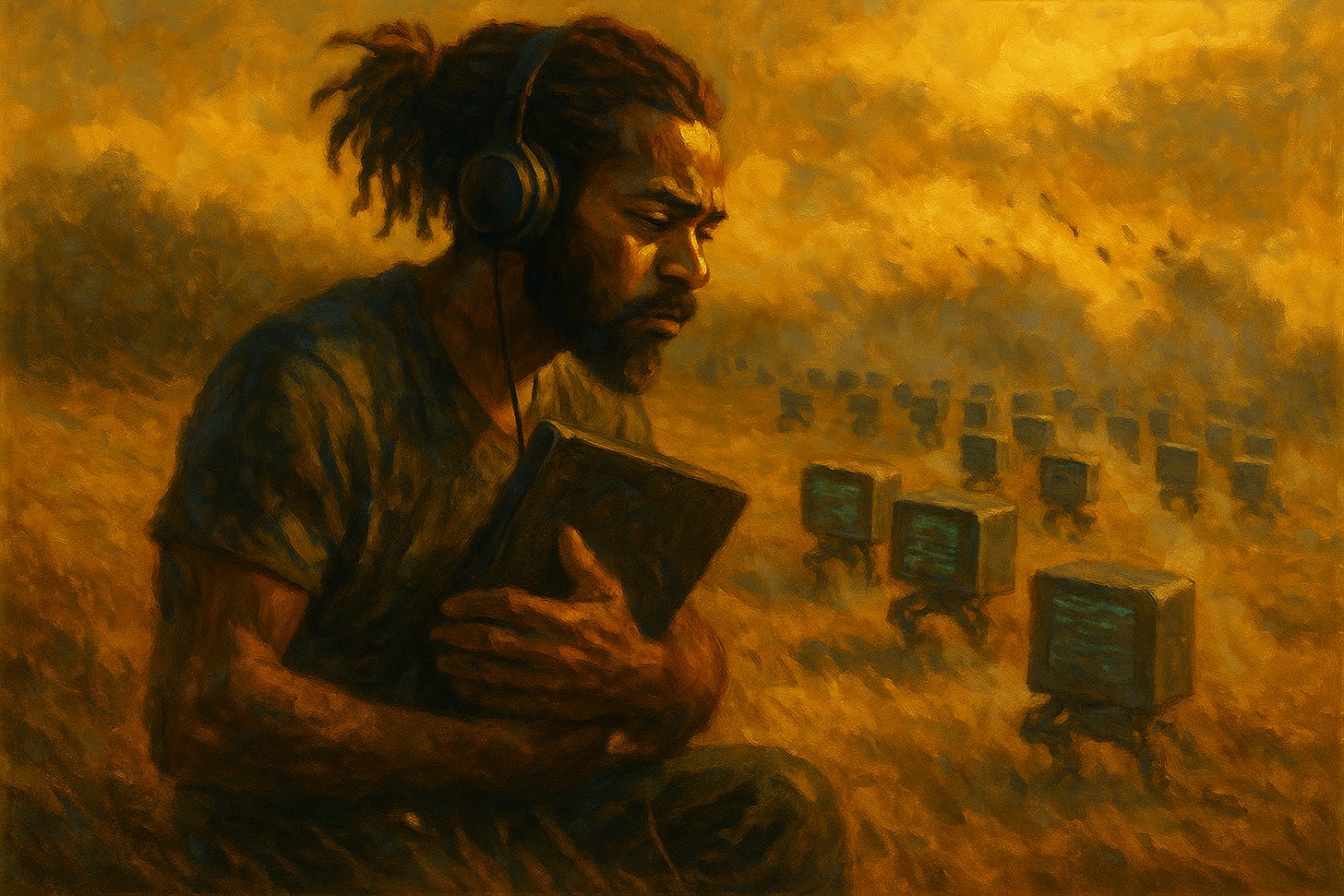🧠 The Hidden Cost of AI Convenience, Part II
The Productivity Paradox and Privacy Risks We Can’t Ignore !
After the GPS, What Else Are We Losing?
Last week, we chopped it up about how AI’s convenience can slyly turn your brain to pap. Remember that GPS analogy? We found our way, but our hippocampus was doing shakara, feeling left out. And that Porcha Woodruff palava? A real-life horror show because judgment was outsourced to a machine, no questions asked. Even our minds, we figured, can suffer "model collapse" if we just keep feeding them AI-generated gist.
Now, let’s go deeper. If our brains are at risk of getting dull, what about our hustle? And what about our private gist?
This week, we're talking about the productivity paradox – when "faster" ain't always better – and the privacy risks that come with letting AI into every corner of your life. It’s about keeping your mind sharp and your data safe, even when the bots are screaming "convenience!"
The Hype: AI as Your New Workhorse
Look, I’m not gonna lie—tools like ChatGPT, Copilot, and all these AI sidekicks? They’ve saved me hours. Laravel boilerplate? Done in minutes. Test cases? AI drafts it while I sip my coffee. Some studies even claim AI can boost productivity by up to 40%. Omo, who no wan , sleep day work at the same time? It's like having a team of junior devs who never sleep and rarely complain.
But here’s the real twist on that "outsourcing our minds" gist. Just like GPS makes us forget how to navigate, AI can make us forget how to think the hard stuff.
Last week, I told you how I caught myself letting ChatGPT write code comments without fully understanding the logic. It was fast, sure—but when wahala hit—one bug like that—I struggled to debug because I hadn’t internalized the code’s intent. That’s not just shallow understanding; it’s a form of deskilling. We might be "productive," but are we becoming less capable as developers? Are we outsourcing our actual coding brain cells?
Researchers call this the “automation complacency” effect. It’s where you trust the AI so much, you stop checking its work. Remember Porcha Woodruff? That’s what happens when judgment gets fully outsourced. In our world, it’s when AI generates a complex query or a tricky middleware, and you deploy it without truly understanding its implications. You feel productive, but your problem-solving muscle dey sleep. That's a slow "model collapse" for your own brain.
The Real Wahala: Decision Fatigue and Too Many Options
AI’s meant to reduce stress, but sometimes it just gives you too many choices, drowning you in a sea of "suggestions." Four different AI bots, four different ways to solve one Laravel bug. Picking the right one? Sometimes harder than just writing it yourself. That’s decision fatigue, bruv. And it’s real. It’s like having a dozen maps on your screen and still feeling lost.
How I Keep My Head Straight
Set boundaries: Let AI handle the small stuff, but always do the thinking yourself. If it feels too easy, question it.
Go offline: I do “AI-free” sprints—just me, VS Code, and my brain. No auto-suggestions, no quick answers. It’s like forcing your hippocampus to do squats.
Don’t just copy-paste: If AI suggests code, tweak it. Make it yours. Understand it. Learn from it. That’s how you fight your own "model collapse."
Privacy — The Real Price Tag on AI Convenience
Fam, every time you use AI, you’re feeding it data—sometimes your own, sometimes your company’s, sometimes your client’s gist. These models? They’re trained on everything from your tweets to your Slack DMs. And most of us just dey click “accept” like say na free jollof, without reading the fine print. This is the invisible cost your Part One hinted at.
Remember that LinkedIn palava? Millions of users’ data used to train AI—nobody asked them first. That’s how privacy gets chopped in the name of progress. It’s not just "convenience"; it’s a constant data transaction.
Beyond the Screen: When AI Knows Too Much (And What It Does With It)
It’s not just about your emails or code. AI can munch on health records, bank details, even your location. If that gist leaks, it’s not just embarrassment—it’s real-life consequences. Surveillance, profiling, discrimination—these are not just Black Mirror stories, they’re happening now. The deeper AI integrates, the more exposed your digital footprint becomes.
The Legal Maze: GDPR, EU AI Act, and All That
Yeah, there are laws—GDPR, EU AI Act, and the rest. But enforcement? Sometimes na story. Companies are stuck between chasing productivity and respecting your privacy. Most times, na productivity win. These regulations are trying to catch up, but AI moves at light speed. It's like trying to put a fence around a tornado, bruv.
How I Guard My Data
No sensitive gist for AI: If it’s confidential or proprietary, it doesn't go into a public AI tool. Period.
Transparency or nothing: If a tool doesn’t tell me how my data’s used and secured, I bounce. Simple.
Support privacy-first tech: Vote with your wallet and your code. Demand better from the tools you use.
Striking the Balance — Productivity Without Selling Your Soul
Developers are waking up. Stuff like federated learning (where AI learns without actually seeing your raw data) and differential privacy (making your data anonymous) means AI can learn without stealing all your gist. It’s early days, but I dey watch. These innovations mean we don't have to choose between progress and privacy.
The Real Plug: Human Judgment Is Your Superpower
At the end of the day, AI is just a tool. Your judgment—that ability to apply knowledge in context, as Kant put it—your ethics, your creativity? That’s what makes you the boss. That’s your firewall against the "model collapse" of your own mind.
How I Stay Sharp:
Question everything: Don’t accept AI’s answer just because it sounds smart. Test it. Break it. Fix it.
Sensitive work? Go manual: For client secrets or personal stuff, I trust my own skills.
Community is key: I chop ideas with other devs—Discord, X, wherever. We share war stories, catch each other’s blind spots, and keep each other accountable. No gatekeeping here, fam.
Conclusion: Mindful AI Use—That’s the Real Flex
AI can make you faster, but don’t let it make you lazy. The hidden costs—soft skills, privacy, your own intuition—are too expensive to ignore. They’re the real bill for all that convenience.
The future belongs to those who use AI mindfully: leveraging its strengths to amplify their hustle, while guarding their creativity, judgment, and privacy like pure gold.
So, next time you fire up ChatGPT or Copilot, ask yourself:
Am I using this to level up, or am I letting it level me?
Am I protecting my data and my autonomy—or trading them for convenience?
Bruv, your mind is still the baddest processor in the room. Don’t forget it.
Let’s Chop It Up
How’s AI changing your workflow? Have you faced privacy wahala? Hit reply or catch me on Discord—let’s share war stories and tips.
If you missed my last article, no worries—read it here:
👉
🧠 The Hidden Cost of AI Convenience: Are We Outsourcing Our Minds?
We built AI to help us think faster, work smarter, and do more. But what if the very tools designed to sharpen us… are quietly making us duller?
If this hit you, consider buying me a coffee ☕
☕ https://pay.chippercash.com/pay/GNMOCTZHWP
More AI tech gist dropping next week. Stay sharp, my Gs!
👉 Join the conversation: https://discord.gg/PRKzP67M
👀 Follow me for more.
Enjoyed this? drop send a Message bellow and join the chat










